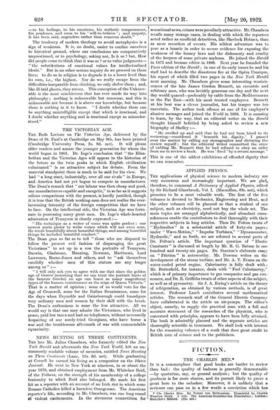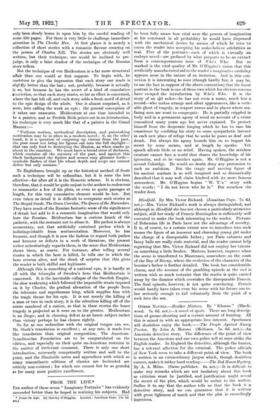FICTION.
THE CHARLES MEN.*
IT is a commonplace that good books are harder to review than bad : the quality of badness is generally demonstrable —by quotation, say, or general analysis ; but the quality of goodness is far more elusive, and its pursuit likely to prove a great bore to the onlooker. Moreover, it is unlikely that a reviewer can pass on in a few words a conviction which has • The Charles Men. By Verner von Heklenstam. Translated by Charles Wharton Stork. 2 vols. The American-Scandinavian Foundation ; London: Humphrey Milford. [22s. neLl
only been slowly borne in upon him by the careful reading of some 550 pages. For there is very little to challenge immediate attention in The Charles Men. At first glance it is merely a collection of short stories with a romantic flavour centring on the person of Charles XII. The stories are obviously well written, but their technique, one would be inclined to pre- judge, is only a faint shadow of the technique of the Russian story-tellers.
But the technique of von Heidenstam is a far more structural affair than one would at first suppose. To begin with, he contrives to give the impression that each story one reads is sligLtly better than the last ; not, probably, because it actually is so, but because he has the secret of a kind of cumulative conviction, so that each story starts, so tar as effect is concerned, where the last left off, and each story adds a fresh motif of detail to the epic design of the whole. One is almost surprised, as it were, into calling the work an epic : the general conception of
it takes one unawares. Heidenstam at one time intended to be a painter, and as Fredrik Book points out in an introduction, his technique is very much like that of a painter in the Grand Manner :- "Uniform realism, methodical description, and painstaking motivation may be in place in a modern novel ; if, on the other hand, it is a question of conjuring up visions from the past, the poet must not bring his figures out into the full daylight— that can only lead to destroying the illusion, as when masks go about in the sunshine. We must have a broad river of darkness, which contains all the mystery of the past, and against this black background the figures and scenes may glimmer forth— symbolic flashes of that life whose depth and scope one cannot define but only surmise."
To Englishmen brought up on the historical method of Scott such a technique will be unfamiliar, but it is none the less effective—for after all it is the Homeric scheme. It is obvious,
therefore, that it would be quite unjust to the author to endeavour to summarize a few of his plots, or even to quote passages at
length, for this very cumulative element would be lost. But even taken as detail it is difficult to overpraise such stories as The Stupid Swede, The Green Corridor, The Queen of the Marauders. They have much of the Russian fantastic sense of the significance
of detail, but add to it a romantic imagination that would only bore the Russian. Heidenstam has 'a curious knack of the pathetic, with the restraint not to abuse it. His pathos is always momentary, not that artificially sustained pathos which is indistinguishable from sentimentalism. Moreover, he has humour, and though it is now the fashion to regard both pathos and humour as defects in a work of literature, the present writer unhesitatingly regards them, in the sense that Heidenstam shows them, as assets. For instance, after telling several storks in which the hero is killed, he tells one in which the hero returns alive, and the shock of surprise that this gives the reader is both skilful and legitimate.
Although this is something of a national epic, it is hardly at all with the triumphs of Sweden's hero that Heidenstam is concerned. It is the inevitable collapse of the Swedish Empire, the slow weakening which followed the impossible strain imposed on it by Charles, the gradual alienation of the people from the inhuman and superhuman king, which supplies him with the tragic theme for his epic. It is not merely the killing of a man or two in each story, it is the relentless killing off of the entire manhood of a nation, so that in these stories the lesser tragedy is projected as it were on to the greater. Heidenstam is no Jingo ; and in choosing defeat as an heroic subject rather than victory perhaps he has chosen rightly.
So far as one unfamiliar with the original tongue can see, Mr. Stork's translation is excellent ; at any rate, it reads less like translation than original composition. The American- Scandinavian Foundation are to be congratulated on the edition, and especially on their quite un-American restraint in the matter of irrelevant comment. There is only one short introduction, extremely competently written and well to the point, and the illimitable notes and appendices with which so many transatlantic editions of classics are beclouded are entirely non-existent ; for which one cannot but be as grateful as for many more positive excellences.



































 Previous page
Previous page